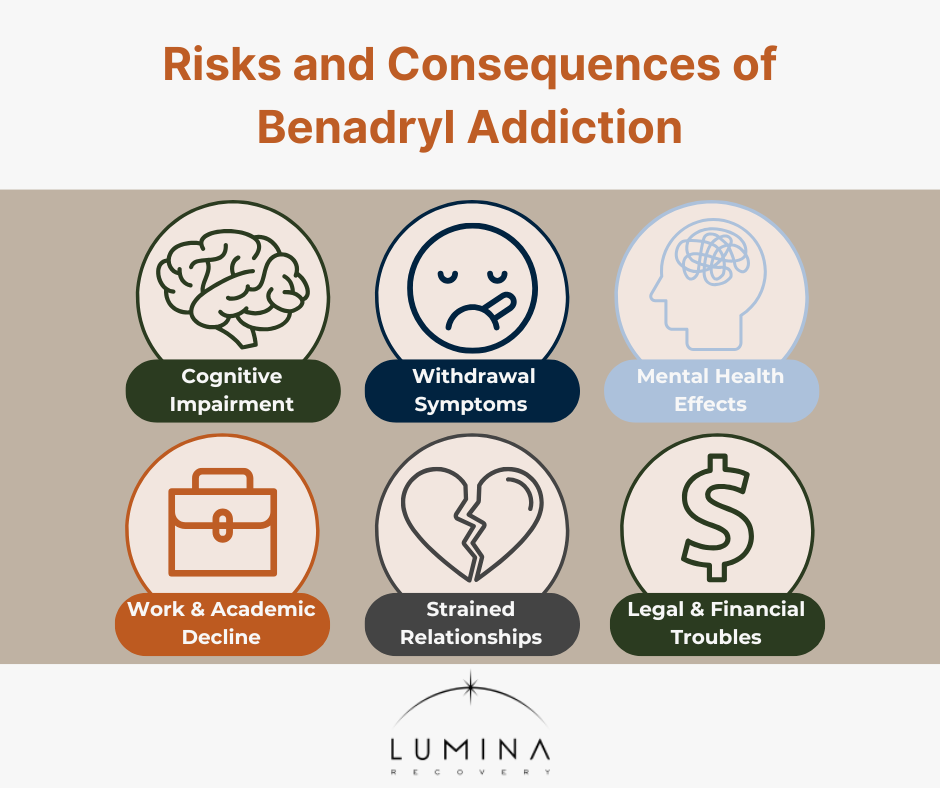Yes, while Benadryl is not considered highly addictive in the traditional sense, misuse of the drug can lead to dependence and withdrawal symptoms.
Benadryl, the brand name for diphenhydramine, is a common over-the-counter medication used to treat symptoms of allergies and allergic reactions such as watery eyes and nasal congestion. It also acts as a sleep aid due to its sedative effect.
While Benadryl is generally safe when used as directed, concerns about its misuse and potential for addiction have been growing.
What Is Benadryl?
Benadryl is an antihistamine that works by blocking histamine receptors in the brain and body.1 It is commonly used to relieve symptoms of allergic reactions, the common cold, and motion sickness. Due to its sedative effect, it is also an ingredient in many sleep aid medications.
It is available in various forms, including tablets, capsules, and liquid solutions, and is widely used for both short-term relief and symptom management. Recommended doses vary based on age and condition, and it is important to follow proper dosage instructions to ensure safe and effective use.
Benadryl Addiction Potential
Addiction is characterized by compulsive drug use despite negative consequences, whereas dependence refers to the body’s reliance on a substance. While Benadryl is not classified as an addictive drug in the same way as opioids or stimulants, it is possible to develop a psychological dependence, particularly for relieving symptoms like insomnia or anxiety.
Benadryl does not cause the same chemical dependence as opioids or stimulants.1 However, frequent use, especially beyond recommended doses, can lead to both short-term and long-term reliance on the drug to induce sleep or reduce anxiety.
Potential for Misuse and Dependence
Some individuals misuse Benadryl for its sedative effects or, in high doses, for its euphoric effects. These higher doses can create temporary hallucinations, heightened drowsiness, and cognitive impairment.
People with sleep disorders or anxiety may unknowingly develop a dependence on Benadryl, using it as a sleep aid instead of seeking safer medical alternatives.
As tolerance increases, individuals may take larger doses of Benadryl to achieve the same sedative effect, increasing their risk of experiencing side effects of Benadryl such as blurred vision, dizziness, and low blood pressure. Prolonged misuse can lead to difficulty sleeping without the drug, further reinforcing the cycle of dependence.2
Because Benadryl is readily available, many individuals mistakenly believe it carries little risk, leading to frequent misuse. However, habitual overuse may contribute to severe health concerns such as memory problems, confusion, and even increased risks of dementia with prolonged use.2
One alarming trend associated with Benadryl misuse is the “Benadryl Challenge,” a viral social media trend on TikTok that encourages individuals, particularly teenagers, to take dangerously high doses of the drug to experience hallucinations.
This challenge has resulted in hospitalizations and, in some cases, fatalities, prompting the FDA and medical professionals to issue strong warnings against participating in or promoting such behavior.1
Individuals who take Benadryl frequently may also experience withdrawal symptoms that reinforce continued use, making it even harder to stop without proper medical guidance.
Signs and Symptoms of Benadryl Addiction
Recognizing the signs of Benadryl addiction is essential for early intervention. The symptoms of addiction can be physical and behavioral, making it important to identify changes in usage patterns before they become severe.
Physical Symptoms
- Increased tolerance requiring higher doses of Benadryl
- Withdrawal symptoms such as headaches, nausea, and insomnia
- Persistent drowsiness or blurred vision
- Heart palpitations or increased heart rate
Behavioral Signs
- Using Benadryl compulsively or in ways not recommended
- Neglecting responsibilities at work, school, or home
- Social withdrawal or secretive behavior
- Experiencing cravings for Benadryl
Risks and Consequences of Benadryl Addiction
Long-term Benadryl misuse can have serious health and lifestyle consequences. From cognitive decline to cardiovascular risks, excessive use of this easily accessible medication can lead to both immediate and long-term harm.2
Long-Term Health Risks
- Cognitive Impairment: Long-term Benadryl use has been linked to memory problems and an increased risk of dementia.
- Withdrawal Symptoms: Excessive use may result in withdrawal effects such as insomnia, sweating, and nausea.
- Mental Health Effects: Anxiety, depression, and psychosis can develop from chronic misuse.
Impact on Daily Life
- Work and Academic Decline: Drowsiness and impaired cognition can affect performance.
- Strained Relationships: Misuse may cause conflicts with family and friends.
- Legal and Financial Troubles: If excessive use leads to accidents or medical emergencies, there may be financial consequences.
Benadryl Withdrawal
When a person stops using Benadryl after prolonged misuse, they may experience withdrawal symptoms. The intensity and duration of withdrawal depend on dosage, frequency of use, and individual health factors.
Common withdrawal symptoms of Benadryl can include insomnia or difficulty sleeping, increased heart rate, excessive sweating, increased saliva production, and enlarged pupils.3 These symptoms can vary in intensity depending on the level of dependence and frequency of use.
Mild cases may resolve within a few days, while severe dependence may require medical support.
Treatment Options for Benadryl Addiction
Recovering from Benadryl addiction requires a combination of professional medical advice and therapeutic interventions.
Medical Interventions
A supervised detox program can help individuals taper off Benadryl safely while managing withdrawal symptoms. In cases of persistent sleep or anxiety issues, medications may be recommended to ease withdrawal symptoms or manage underlying conditions.
Therapeutic Approaches
Cognitive behavioral therapy (CBT) helps individuals identify triggers and develop healthier coping strategies. Support groups such as Narcotics Anonymous (NA) or other peer support networks provide community-based encouragement.
Individual counseling with a therapist can address underlying causes of dependence, such as anxiety or insomnia.
Holistic and Lifestyle Approaches
Incorporating holistic strategies can support long-term recovery. Practices such as mindfulness meditation, yoga, and exercise can help manage anxiety and improve sleep quality without reliance on medication.
Establishing a consistent sleep routine, reducing caffeine intake, and engaging in relaxation techniques can also help manage withdrawal symptoms and improve sleep quality.
Frequently Asked Questions (FAQ)
Is it okay to take Benadryl every night?
While taking Benadryl occasionally for sleep is common, frequent use can lead to psychological dependence and increase the risk of long-term health issues, including memory problems.
Can you get Benadryl withdrawal?
Yes. People who use Benadryl regularly and suddenly stop may experience withdrawal symptoms like insomnia, increased saliva production, increased heart rate, excessive sweating, and enlarged pupils.3
What happens if you use Benadryl every day?
Daily use can result in increased tolerance, psychological dependence, and cognitive impairment. Short-term and long-term use have also been associated with an increased risk of dementia and other health complications.
Get the Support You Deserve With Lumina Recovery
Seeking professional treatment is the best way to overcome Benadryl dependence. Specialized programs provide comprehensive care for short-term and long-term solutions.
Lumina Recovery provides detox programs to manage withdrawal safely and cognitive behavioral therapy (CBT) to address the underlying causes of addiction. Our personalized treatment plans support lasting recovery and overall well-being.
Don’t let Benadryl dependence control your life. Contact Lumina Recovery today for a confidential consultation and take the first step toward healing.
Sources:
- FDA. FDA warns about serious problems with high doses of the allergy medicine diphenhydramine (Benadryl).
- Healthline. Benadryl Side Effects: Examples and Treatment Options.
- Saran JS, Barbano RL, Schult R, Wiegand TJ, Selioutski O. Chronic diphenhydramine abuse and withdrawal: A diagnostic challenge. Neurol Clin Pract. 2017 Oct;7(5):439-441. doi: 10.1212/CPJ.0000000000000304.




